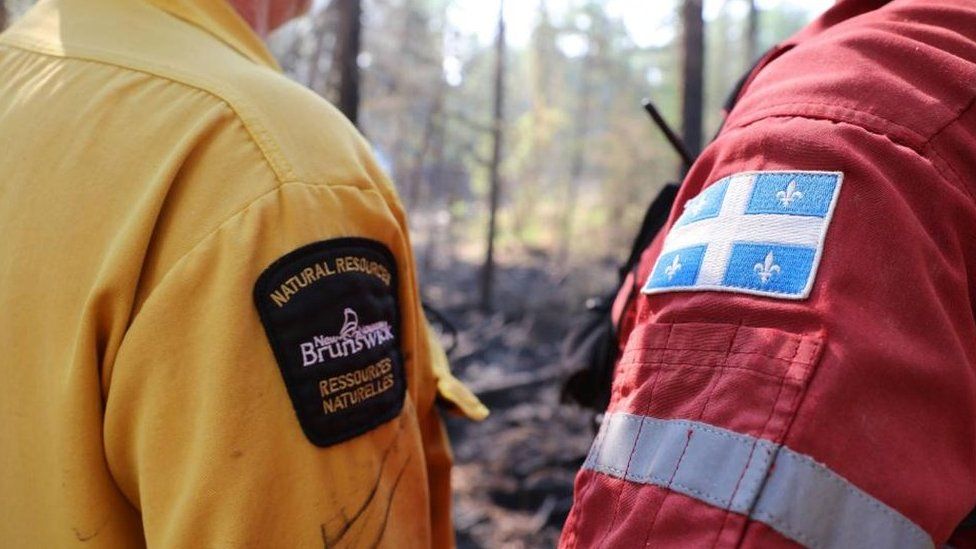ARTICLE AD BOX
 Image source, EPA
Image source, EPA
Canadian provinces typically share firefighting resources to meet the demands of wildfire season. In this photo from Alberta, New Brunswick firefighters are working side-by-side with firefighters from Quebec
By Nadine Yousif
BBC News, Toronto
The wildfires that have blanketed large area of eastern North America with smoke seemingly spread overnight in early June in the Canadian province of Quebec, thanks to dry and hot weather and several strikes of lightning.
Wildfires began to spread quickly early this month, jumping from 36 to over 100 after a 1 June thunderstorm.
After a seemingly ordinary start to the fire season, "within three days, everything went very bad", said Philippe Bergeron with Quebec's firefighting agency.
The growing flames have drained local firefighting resources.
Global firefighters are now beginning to arrive in Quebec to help put out the more than 130 forest fires currently burning in the region.
Around 110 firefighters from France were scheduled to arrive in Quebec on Thursday, and some additional help has already arrived from the nearby province of New Brunswick.
Mr Bergeron told the BBC that the additional help will make "a huge difference" for local firefighters struggling to contain the flames, many of whom are working 14-hour days that begin at sunrise.
"To get a fire extinguished, you need people on the ground doing the job," he said. "The more people there are, the more efficient we're going to be."
Without the extra hands, Mr Bergeron said Quebec's local firefighting capabilities would only be able to handle around 25 to 35 large forest fires at any given time.
The province typically has a base of around 250 local firefighters that are ready to battle wildfires at any given year, Mr Bergeron said - a fraction of the 1,200 that Quebec Premier Francois Legault said is needed to help successfully fight the current fires.
It is already Quebec's worst fire season, with more than 280,000 hectares (691,900 acres) of land burning as of Thursday.
To meet the unprecedented need, the province has trained 300 additional people in Quebec City over the last week so they can be deployed immediately.
Mr Bergeron said they have undergone three days of intense training and "most of them are people experienced in the forest, either forest workers or they have previous firefighting experience".
An additional 600 firefighters from the US are also headed for Canada, with some expected to arrive in Quebec next week, he said.
'Within one day, there was fire everywhere'
As of Thursday, the number of fires in Quebec has decreased from 150 to 137. But a new challenge has emerged: some fires are getting so large, Mr Bergeron said, that they are now merging with other fires.
Quebec has never seen wildfires of this scale, which occur more typically in parts of western Canada, like Alberta and British Columbia.
Watch: Hazardous air quality filmed over New York lake
The province's wildfire season reached a turning point after that 1 June thunderstorm.
"Within one day, there was fire everywhere," Mr Bergeron said.
Since then, nearly 15,000 people in central Quebec have been evacuated from their homes.
Around 20,000 people are evacuated in total in Canada, as fires continue to burn across the country in Alberta, British Columbia, Nova Scotia and the Northwest Territories as well.
Federal officials in Canada have warned that this may be the country's worst wildfire season on record. Nearly four million hectares (9.8 million acres) of land has burned so far in - around 12 times the 10-year average for this time of year.
"That's the equivalent of almost 10 million soccer pitches," Canada's emergency preparedness minister Bill Blair told the BBC's Newshour on Wednesday.
The unusually active season has ignited some calls among politicians for the creation of a national fire service. Canada typically relies on each province sharing resources or help from nearby US states.
When those resources are strained, provinces then call on the federal government for military support, as well as on other countries for international assistance, said Brian Wiens, the managing director of Canada Wildfire, an organisation that researchers wildfire management in partnership with provincial firefighting agencies.
With so many fires burning at once this year, provinces who are battling their own flames now find themselves too strained to share resources.
"We have basically four or five jurisdictions that are asking for help, and there are a couple more jurisdictions that are reluctant to release people because they've got an awful lot going on," Mr Wiens said.
Some, like member of parliament Richard Cannings with the left-leaning New Democratic Party, have criticised the current system as inefficient, especially in the face of what is predicted to be a worsening climate crisis.
"It is clear we need to re-evaluate the federal role in wildfire protection and response," Mr Cannings wrote in a letter to parliament on Monday.
On Wednesday, Prime Minister Justin Trudeau acknowledged that his government is considering creating a national disaster response agency of some kind.
Mr Wiens said Canada may need to rethink its firefighting resources in the future.
"If you want to know what climate change is going to look like, this particular month is pretty typical of what you can expect," he said, adding that provinces may need to consider increasing their staff to meet future firefighting demands.

 2 years ago
61
2 years ago
61








 English (US) ·
English (US) ·